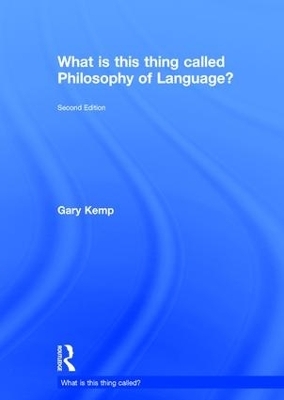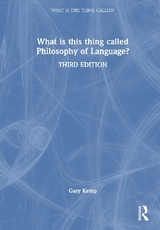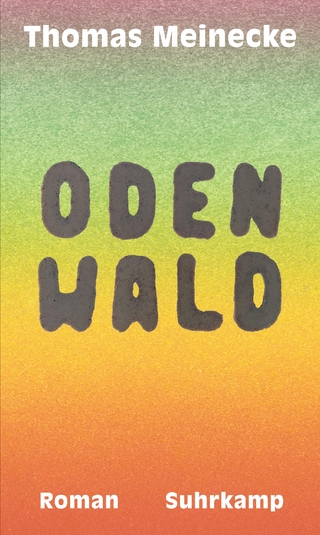
What is this thing called Philosophy of Language?
Seiten
2017
|
2nd edition
Routledge (Verlag)
978-1-138-22581-7 (ISBN)
Routledge (Verlag)
978-1-138-22581-7 (ISBN)
- Titel erscheint in neuer Auflage
- Artikel merken
Zu diesem Artikel existiert eine Nachauflage
The ideas of some of the subject's great founding figures, such as Frege, Wittgenstein and Russell, as well as Saul Kripke and Hilary Putnam, are central to many philosophical debates. Chapter summaries, annotated further reading and a glossary make this an indispensable introduction to students coming to the subject for the first time.
Philosophy of language explores some of the most abstract yet most fundamental questions in philosophy. The ideas of some of the subject's great founding figures, such as Gottlob Frege, Ludwig Wittgenstein and Bertrand Russell, as well as of more recent figures such as Saul Kripke and Hilary Putnam, are central to a great many philosophical debates to this day.
In this clear and carefully structured introduction to the subject Gary Kemp explains the following key topics:
the basic nature of philosophy of language, its concepts, and its historical development
Frege’s theory of sense and reference; Russell's theory of definite descriptions
Wittgenstein's Tractatus, Ayer, and the Logical Positivists
recent perspectives including Kripke, Kaplan and Putnam; arguments concerning necessity, indexicals, rigid designation and natural kinds
The pragmatics of language, including speech-acts, presupposition and conversational implicature
Davidson’s theory of language, the ‘principle of charity’, and the indeterminacy of interpretation
puzzles surrounding the propositional attitudes (sentences which ascribe beliefs to people)
Quine’s naturalism and its consequences for philosophy of language.
The challenges presented by the later Wittgenstein
Contemporary directions, including contextualism, fictional objects and the phenomenon of slurs
This second edition has been thoroughly revised to include new key topics and updated material. Chapter summaries, annotated further reading and a glossary make this an indispensable introduction to those teaching philosophy of language and will be particularly useful for students coming to the subject for the first time.
Philosophy of language explores some of the most abstract yet most fundamental questions in philosophy. The ideas of some of the subject's great founding figures, such as Gottlob Frege, Ludwig Wittgenstein and Bertrand Russell, as well as of more recent figures such as Saul Kripke and Hilary Putnam, are central to a great many philosophical debates to this day.
In this clear and carefully structured introduction to the subject Gary Kemp explains the following key topics:
the basic nature of philosophy of language, its concepts, and its historical development
Frege’s theory of sense and reference; Russell's theory of definite descriptions
Wittgenstein's Tractatus, Ayer, and the Logical Positivists
recent perspectives including Kripke, Kaplan and Putnam; arguments concerning necessity, indexicals, rigid designation and natural kinds
The pragmatics of language, including speech-acts, presupposition and conversational implicature
Davidson’s theory of language, the ‘principle of charity’, and the indeterminacy of interpretation
puzzles surrounding the propositional attitudes (sentences which ascribe beliefs to people)
Quine’s naturalism and its consequences for philosophy of language.
The challenges presented by the later Wittgenstein
Contemporary directions, including contextualism, fictional objects and the phenomenon of slurs
This second edition has been thoroughly revised to include new key topics and updated material. Chapter summaries, annotated further reading and a glossary make this an indispensable introduction to those teaching philosophy of language and will be particularly useful for students coming to the subject for the first time.
Gary Kemp is Senior Lecturer in Philosophy at the University of Glasgow, UK. He has authored or edited various books and articles in the Philosophy of language, including Quine versus Davidson: Truth, Reference and Meaning.
List of figures and tables. Preface. Introduction. 1 Naïve semantics and the language of logic. 2 Fregean semantics. 3 Russellian semantics. 4 Russell’s Theory of Judgement, The Early Wittgenstein, and Logical Positivism. 5 Kripke on naming and necessity. 6 Context dependence, indexicality and natural kinds. 7 Pragmatics. 8 The propositional attitudes. 9 Davidson’s philosophy of language. 10 Quine’s philosophy of language. 11 The Late Wittgenstein. 12 Modern directions. Glossary. Bibliography. Index
| Erscheinungsdatum | 19.02.2018 |
|---|---|
| Reihe/Serie | What is this thing called? |
| Zusatzinfo | 7 Tables, black and white |
| Verlagsort | London |
| Sprache | englisch |
| Maße | 174 x 246 mm |
| Gewicht | 589 g |
| Themenwelt | Geisteswissenschaften ► Philosophie ► Sprachphilosophie |
| ISBN-10 | 1-138-22581-9 / 1138225819 |
| ISBN-13 | 978-1-138-22581-7 / 9781138225817 |
| Zustand | Neuware |
| Informationen gemäß Produktsicherheitsverordnung (GPSR) | |
| Haben Sie eine Frage zum Produkt? |
Mehr entdecken
aus dem Bereich
aus dem Bereich
Wie die Menschheit zu ihrer größten Erfindung kam
Buch | Softcover (2022)
C.H.Beck (Verlag)
CHF 25,20
Macht und Legitimität politischer Sprache im Prozess der europäischen …
Buch | Softcover (2023)
Nomos (Verlag)
CHF 103,60



